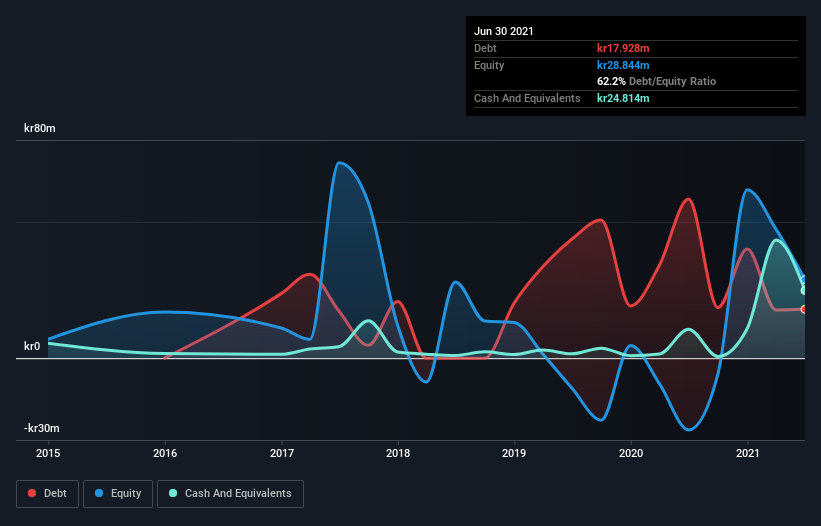Health Check: How Prudently Does Urb-it (STO:URBIT) Use Debt?

Some say volatility, rather than debt, is the best way to think about risk as an investor, but Warren Buffett famously said that 'Volatility is far from synonymous with risk.' When we think about how risky a company is, we always like to look at its use of debt, since debt overload can lead to ruin. We note that Urb-it AB (publ) (STO:URBIT) does have debt on its balance sheet. But is this debt a concern to shareholders?
Why Does Debt Bring Risk?
Debt assists a business until the business has trouble paying it off, either with new capital or with free cash flow. Part and parcel of capitalism is the process of 'creative destruction' where failed businesses are mercilessly liquidated by their bankers. However, a more common (but still painful) scenario is that it has to raise new equity capital at a low price, thus permanently diluting shareholders. Of course, the upside of debt is that it often represents cheap capital, especially when it replaces dilution in a company with the ability to reinvest at high rates of return. The first thing to do when considering how much debt a business uses is to look at its cash and debt together.
See our latest analysis for Urb-it
How Much Debt Does Urb-it Carry?
As you can see below, Urb-it had kr17.9m of debt at June 2021, down from kr58.3m a year prior. But it also has kr24.8m in cash to offset that, meaning it has kr6.89m net cash.

A Look At Urb-it's Liabilities
Zooming in on the latest balance sheet data, we can see that Urb-it had liabilities of kr21.1m due within 12 months and liabilities of kr3.75m due beyond that. Offsetting this, it had kr24.8m in cash and kr6.25m in receivables that were due within 12 months. So it can boast kr6.18m more liquid assets than total liabilities.
This state of affairs indicates that Urb-it's balance sheet looks quite solid, as its total liabilities are just about equal to its liquid assets. So it's very unlikely that the kr910.9m company is short on cash, but still worth keeping an eye on the balance sheet. Simply put, the fact that Urb-it has more cash than debt is arguably a good indication that it can manage its debt safely. There's no doubt that we learn most about debt from the balance sheet. But ultimately the future profitability of the business will decide if Urb-it can strengthen its balance sheet over time. So if you're focused on the future you can check out this free report showing analyst profit forecasts.
In the last year Urb-it wasn't profitable at an EBIT level, but managed to grow its revenue by 76%, to kr22m. Shareholders probably have their fingers crossed that it can grow its way to profits.
So How Risky Is Urb-it?
By their very nature companies that are losing money are more risky than those with a long history of profitability. And we do note that Urb-it had an earnings before interest and tax (EBIT) loss, over the last year. And over the same period it saw negative free cash outflow of kr65m and booked a kr65m accounting loss. Given it only has net cash of kr6.89m, the company may need to raise more capital if it doesn't reach break-even soon. Urb-it's revenue growth shone bright over the last year, so it may well be in a position to turn a profit in due course. Pre-profit companies are often risky, but they can also offer great rewards. The balance sheet is clearly the area to focus on when you are analysing debt. However, not all investment risk resides within the balance sheet - far from it. For instance, we've identified 4 warning signs for Urb-it (1 makes us a bit uncomfortable) you should be aware of.
If you're interested in investing in businesses that can grow profits without the burden of debt, then check out this free list of growing businesses that have net cash on the balance sheet.
New: AI Stock Screener & Alerts
Our new AI Stock Screener scans the market every day to uncover opportunities.
• Dividend Powerhouses (3%+ Yield)
• Undervalued Small Caps with Insider Buying
• High growth Tech and AI Companies
Or build your own from over 50 metrics.
This article by Simply Wall St is general in nature. We provide commentary based on historical data and analyst forecasts only using an unbiased methodology and our articles are not intended to be financial advice. It does not constitute a recommendation to buy or sell any stock, and does not take account of your objectives, or your financial situation. We aim to bring you long-term focused analysis driven by fundamental data. Note that our analysis may not factor in the latest price-sensitive company announcements or qualitative material. Simply Wall St has no position in any stocks mentioned.
Have feedback on this article? Concerned about the content? Get in touch with us directly. Alternatively, email editorial-team (at) simplywallst.com.
About OM:URBIT
Mediocre balance sheet and slightly overvalued.
Market Insights
Community Narratives



